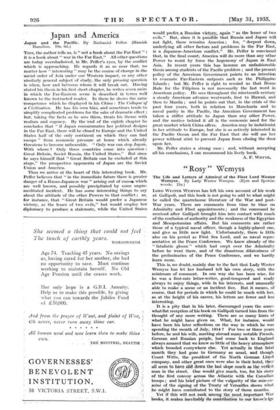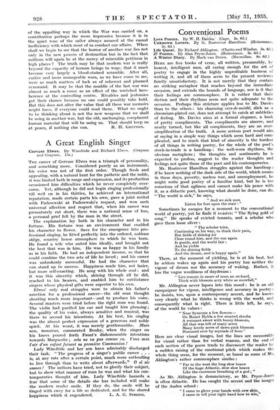"Rosy " Wemyss
LORD WESTER WEMYSS has left his own account of his work at Gallipoli, and this book is not going to add to what might be called the quarrelsome literature of the War and post- War years. There are comments from time to time on Admiralty and Fleet appointments ; and the command he received after Gallipoli brought him into contact with much of the confusion of authority and the weakness of the Egyptian and Mesopotamian affairs. But his comments are rather those of a typical naval officer, though a highly-placed one, and give us little new light. Unfortunately, there is little also on his period as First Sea Lord, and as naval repre- sentative at the Peace Conference. We knew already of the " fatalistic gloom " which had crept over the Admiralty before he went •there, and of •the disastrous dilatoriness of the preliminaries of the Peace Conference, and we hardly learn more.
This is, no doubt, mainly due to the fact that Lady Wester Wemyss has let her husband tell his own story, with the minimum of comment. In one way she has been wise, for he was a first-rate letter-writer, good-tempered and ready always to enjoy things, wide in his interests, and unusually able to make a scene or an incident live. But it means, of course, that for periods in which he could be much with her, as at the height of his career, his letters are fewer and less interesting.
It is a pity that in his later, discouraged years the some- what flat reception of his book on Gallipoli turned him from the thought of any more writing. There are so many hints of what he might have given us. What, for instance, would have been- his later reflections on the way in which he was -spending the month of July, 1914 ? For two or three years before, he and his wife, meeting abroad many notable French, German and Russian people, had come back to England always amazed that we knew so little of the heavy atmosphere which brooded everywhere else. Yet actually in that fatal mouth they had gone to Germany as usual, and though Count Witte, the president of the North German Lloyd company, and other great ones were also in their hotel, they all seem to have slid down the last slope much as the.veriest man in the street. One would give much, too, for his story of the first convoy across the Atlantic with the Canadian troops ; and his brief picture of the vulgarity of the mice-en- scene of the signing of the Treaty of Versailles shows what he might have contributed to the story of those months.
Yet if this will not rank among t1;e most important War books, it makes inevitably its contribution to our knove.eige
of the appalling way in which the War was carried on, a contribution perhaps the more impressive because it is in the quiet tone of the sailor always amazed at the casual inefficiency with which most of us conduct our affairs. When shall we begin to see that the horror of another war lies not only in the new powers of destruction but in the fact that millions will again be at the mercy of miserable pettiness in high places ? The truth may be that modern war is really beyond the capacity of human beings to wage, that it must become very largely a blood-stained scramble. After all, earlier and more manageable wars, as we have come to see, were as much matters of luck as of coherent and planned command. It may be that the muddle of the last war was almost as much a cause as an effect of the wretched inco- herence at the controlling centre. Rivalries and jealousies got their chance because no one could possibly take hold. But this does not alter the value that all these war memoirs might have, if everyone could read them. What we ought to be thinking about is not the new weapons that we shall be using in another war, but the old, unchanging, complacent human material that will be using us. That should keep us at peace, if nothing else can. R. H. GRETTON.



























































 Previous page
Previous page